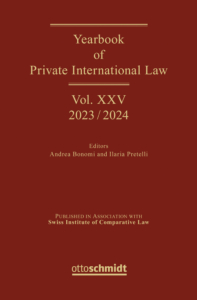Views
Polish Constitutional Court about to review the constitutionality of the jurisdictional immunity of a foreign State?
Written by Zuzanna Nowicka, lawyer at the Helsinki Foundation for Human Rights and lecturer at Department of Logic and Legal Argumentation at University of Warsaw
In the aftermath of the judgment of the ICJ of 2012 in the case of the Jurisdictional Immunities of the State (Germany v. Italy: Greece intervening) that needs no presentation here (for details see, in particular, the post by Burkhard Hess), by its judgment of 2014, the Italian Constitutional Court recognized the duty of Italy to comply with the ICJ judgment of 2012 but subjected that duty to the “fundamental principle of judicial protection of fundamental rights” under Italian constitutional law (for a more detailed account of those developments see this post on EAPIL by Pietro Franzina and further references detailed there). In a nutshell, according to the Italian Constitutional Court, the fundamental human rights cannot be automatically and unconditionally sacrificed in each and every case in order to uphold the jurisdiction immunity of a foreign State allegedly responsible for serious international crimes.
Since then, the Italian courts have reasserted their jurisdiction in such cases, in some even going so far as to decide on the substance and award compensation from Germany. The saga continues, as Germany took Italy to the ICJ again in 2022 (for the status of the case pending before the ICJ see here). It even seems not to end there as it can be provocatively argued that this saga has its spin-off currently taking place before the Polish courts.
The Greek Supreme Court has decided: Relatives of persons killed in accidents are immediate victims
A groundbreaking judgment was rendered last October by the Greek Supreme Court. Relatives of two Greek crew members killed in Los Llanos Air Base, Spain, initiated proceedings before Athens courts for pain and suffering damages (solatium). Although the action was dismissed by the Athens court of first instance, and the latter decision was confirmed by the Athens court of appeal, the cassation was successful: The Supreme Court held that both the Brussels I bis Regulation and the Lugano Convention are establishing international jurisdiction in the country where the relatives of persons killed are domiciled, because they must be considered as direct victims.
THE FACTS
On 26 January 2015, an F-16D Fighting Falcon jet fighter of the Hellenic Air Force crashed into the flight line at Los Llanos Air Base in Albacete, Spain, killing 11 people: the two crew members and nine on the ground.
The relatives of the Greek crew members filed actions for pain and suffering damages before the Athens court of first instance against a US (manufacturer of the aircraft) and a Swiss (subsidiary of the manufacturer) company. The action was dismissed in 2019 for lack of international jurisdiction. The appeals lodged by the relatives before had the same luck: the Athens court of appeal confirmed in 2020 the first instance ruling. The relatives filed a cassation, which led to the judgment nr. 1658/5.10.2022 of the Supreme Court.
Standard (and burden) of proof for jurisdiction agreements
Courts are often required to determine the existence or validity of jurisdiction agreements. This can raise the question of the applicable standard of proof. In common law jurisdictions, the question is not free from controversy. In particular, Stephen Pitel has argued on this very blog that jurisdiction clauses should be assessed on the balance of probabilities, as opposed to the “good arguable case” standard that is commonly applied (see, in more detail, Stephen Pitel and Jonathan de Vries “The Standard of Proof for Jurisdiction Clauses” (2008) 46 Canadian Business Law Journal 66). That is because the court’s determination on this question will ordinarily be final – it will not be revisited at trial.
News
[Now Available] Yearbook of Private International Law Vol. XXV – 2023/2024
 The latest volume of the Yearbook of Private International Law has been recently published, marking the 25th anniversary of its significant contribution to outstanding legal scholarship in the field of comparative private international law.
The latest volume of the Yearbook of Private International Law has been recently published, marking the 25th anniversary of its significant contribution to outstanding legal scholarship in the field of comparative private international law.
Readers will undoubtedly appreciate the Editors’ Foreword as well as the insightful tributes dedicated to this milestone edition written by Professors Nadjma Yassari (A Quarter-Century of Excellence), Symeon C. Symeonides (A Tribute), and Ivana Kunda (Petar Šarcevic – The Intellectual Behind the Name). These contributions, which reflect on the Yearbook’s impact and achievements over the years, are freely available online, offering a fitting celebration of this remarkable anniversary.
The Yearbook’s latest volume features the following table of contents: Read more
5th German Conference for Young Researchers in Private International Law, 14 and 15 Feb 2025, University of Heildeberg
On 14 and 15 February 2025, the 5th iteration of the German Conference for Young Researchers in Private International Law will take place at the University of Heidelberg. The conference – which is being organized by Felix Berner, Andreas Engel, Aron Johanson, Markus Lieberknecht, Sophia Schwemmer, Ann-Kathrin Voß, Charlotte Wendland, and Anton Zimmermann – is dedicated to the topic of ‘Digital transformation and Private International Law. Local connections in boundless spaces’:
After statute theory, Savignyan PIL and Europeanisation, digitalisation has the potential to initiate a fourth evolutionary stage in the history of conflict of laws, which is characterised by decentralisation and delocalisation. We may therefore be on the threshold of a PIL 4.0. At our conference, we would like to discuss how the conflict-of-laws problems arising from the boundless spaces of digitalisation can be solved in European and autonomous German, Austrian and Swiss private international law. At the same time, we would like to look at the possibilities for legal changes at national, European and international level.
A keynote will be given by Christiane Wendehorst (University of Vienna).
The programme can be found here; registration is possible here.
More information can also be found on the conference website.
ICC Institute of World Business Law Prize 2025: Open for Submissions until 7 April 2025
Every two years, the ICC Institute of World Business Law awards a prize worth € 10,000 to the best doctoral dissertation or long essay on on international commercial law (including arbitration) written by an author under the age of 40 in English or French.
Submissions can be made until 7 April 2025.
More information can be found in the flyer and in the prize rules.





